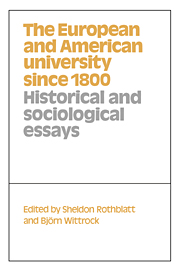Book contents
- Frontmatter
- Contents
- Notes on the contributors
- Introduction: universities and ‘higher education’
- Part I Fact and ideals in liberal education
- 1 The limbs of Osiris: liberal education in the English-speaking world
- 2 In search of Isis: general education in Germany and Sweden
- Part 2 The State, the university, and the professions
- Part 3 The ambiguities of university research in Sweden and the United States
- Part 4 Complexity
- Part 5 The ironies of university history
- Index
2 - In search of Isis: general education in Germany and Sweden
Published online by Cambridge University Press: 04 August 2010
- Frontmatter
- Contents
- Notes on the contributors
- Introduction: universities and ‘higher education’
- Part I Fact and ideals in liberal education
- 1 The limbs of Osiris: liberal education in the English-speaking world
- 2 In search of Isis: general education in Germany and Sweden
- Part 2 The State, the university, and the professions
- Part 3 The ambiguities of university research in Sweden and the United States
- Part 4 Complexity
- Part 5 The ironies of university history
- Index
Summary
In her aspect as the wife of Osiris she is the chief actor, but only after his death: she finds his corpse at Byblos, she finds the fragments of the dismembered body scattered throughout Egypt, she is the chief mourner at the funeral, she unites the fragments of the body and, by her divine power, brings Osiris to life again.
Encyclopaedia BrittanicaIn this chapter, I intend to call attention to the German concept of Bildung as well as to its generally less well-known Swedish counterpart of Bildning. These words have much to tell us about both German and Swedish intellectual traditions. Bildung and Bildning start their careers at the end of the eighteenth century, and even today they are quite central to actual discussions about school and society. Of course, their meanings have shifted over the centuries, and these changes were closely linked to the social, political, and institutional circumstances in both countries.
The German Ideology of Bildung
Culture and enlightenment
In 1784 in the Berliner Monatsschrift there appeared some articles concerning the meaning of the word ‘enlightenment’, its supposed ‘real’ meaning. Immanuel Kant's little masterpiece, An Answer to the Question of Enlightenment (Beantwortung der Frage: Was ist Aufklärung?) is still widely read and commented upon. The great German-Jewish philosopher, Moses Mendelssohn, contributed to the discussion with a succinct and lucid article called, On the Subject of the Meaning of Enlightenment (Über die Frage: was heisst Aufklären?). Mendelssohn started his essay with the remark that the words Aufklädrung, Kultur, and Bildung were newcomers to the German language. Ordinary people hardly understood them.
- Type
- Chapter
- Information
- The European and American University since 1800 , pp. 74 - 106Publisher: Cambridge University PressPrint publication year: 1993
- 14
- Cited by

